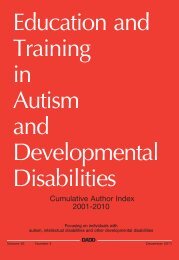etadd_47(3) - Division on Autism and Developmental Disabilities
etadd_47(3) - Division on Autism and Developmental Disabilities
etadd_47(3) - Division on Autism and Developmental Disabilities
You also want an ePaper? Increase the reach of your titles
YUMPU automatically turns print PDFs into web optimized ePapers that Google loves.
students opportunities to work <strong>and</strong> be active<br />
adults in the community. As l<strong>on</strong>g as the students<br />
stay in their families <strong>and</strong> work or participate<br />
in the local areas or neighborhoods<br />
where they live, they will be accepted. The<br />
community is unsure about greater visibility<br />
for these students <strong>and</strong> needs more educati<strong>on</strong><br />
<strong>and</strong> assurance about their skills <strong>and</strong> abilities.<br />
One church leader explained:<br />
The opportunity of the school or the role of<br />
the school in society is to show that it is<br />
completely possible that these children go<br />
to school like other children <strong>and</strong> the school<br />
has helped also in the educati<strong>on</strong> [of the<br />
community] through words <strong>and</strong> acti<strong>on</strong>s to<br />
see that “it is possible, it can be d<strong>on</strong>e” <strong>and</strong><br />
indeed the meaning of the school is to push<br />
other schools <strong>and</strong> teachers to show respect<br />
for those who do this work <strong>and</strong> to recognize<br />
that in our district there is a school that<br />
provides this service. Therefore, I can say<br />
that in our community or in society the<br />
school dem<strong>on</strong>strates to the society that children<br />
have rights to receive an educati<strong>on</strong><br />
like all other children. It is a school like any<br />
other school, therefore [Rainbow] is indeed<br />
showing that [to society].<br />
There is still a disc<strong>on</strong>nect am<strong>on</strong>g community<br />
members between having skills <strong>and</strong> being able<br />
to do the job. Students with disabilities from<br />
the school can dem<strong>on</strong>strate their skills to help<br />
a carpenter, clean a shop, or wash dishes, but<br />
thus far when school administrators try to find<br />
jobs for these students both in church instituti<strong>on</strong>s<br />
<strong>and</strong> in community instituti<strong>on</strong>s, people<br />
are not welcoming <strong>and</strong> worry about the risks<br />
of employing a pers<strong>on</strong> with a disability, such as<br />
poor behavior or reduced productivity. The<br />
lack of formal employment opti<strong>on</strong>s in the<br />
country, particularly in rural areas, exacerbates<br />
this problem.<br />
Students can stay at home with their families<br />
in the extended household after school,<br />
but will need some way to earn m<strong>on</strong>ey for<br />
basic supplies <strong>and</strong> to reduce their burden <strong>on</strong><br />
their family. In this community, the needs are<br />
very basic, but the chances for employment<br />
outside the home are few <strong>and</strong> the possible pay<br />
is also small. Students have the best chance to<br />
earn m<strong>on</strong>ey by making or growing things <strong>and</strong><br />
selling them in the market. Families are sup-<br />
portive of their children <strong>and</strong> believe that they<br />
can participate in the family <strong>and</strong> community,<br />
but it has taken time <strong>and</strong> educati<strong>on</strong> to c<strong>on</strong>vince<br />
the parents <strong>and</strong> the community members.<br />
The children have the skills to facilitate<br />
participati<strong>on</strong> <strong>and</strong> acceptance, but must be<br />
given the chance.<br />
Discussi<strong>on</strong> <strong>and</strong> Implicati<strong>on</strong>s<br />
Despite the current emphasis <strong>on</strong> evidencebased<br />
practice in special educati<strong>on</strong> (Arnove,<br />
2003), there is a great need to educate students<br />
with disabilities to be members of the<br />
community <strong>and</strong> to provide them with the skills<br />
<strong>and</strong> knowledge to be active in the community.<br />
Given these circumstances, curriculum must<br />
be resp<strong>on</strong>sive to the local needs of the students<br />
<strong>and</strong> their community, as well as individual<br />
needs of the students. The curriculum at<br />
the school, as it is enacted by the teachers,<br />
should reflect the community’s funds of<br />
knowledge.<br />
This research can serve both as a study to<br />
support the work at the Irente Rainbow<br />
School <strong>and</strong> a case study for underst<strong>and</strong>ing<br />
how local beliefs <strong>and</strong> practices influence curriculum<br />
<strong>and</strong> community integrati<strong>on</strong> for students<br />
with disabilities in other rural communities<br />
especially in Tanzania, throughout<br />
Africa <strong>and</strong> in developing countries. This study<br />
can help to explain the unique situati<strong>on</strong> in<br />
Lushoto, Tanzania <strong>and</strong> be used in the development<br />
of a protocol for underst<strong>and</strong>ing the<br />
local c<strong>on</strong>text, which can be useful in other<br />
settings. The findings from the study also provide<br />
an opportunity to critically examine how<br />
to provide opportunities for individuals with<br />
disabilities in local communities for integrati<strong>on</strong><br />
in order to support them, their families<br />
<strong>and</strong> their community. This study has implicati<strong>on</strong>s<br />
for practice in Tanzania <strong>and</strong> the United<br />
States, but it also has global implicati<strong>on</strong>s for<br />
teacher educati<strong>on</strong> <strong>and</strong> training around the<br />
world. The c<strong>on</strong>ceptual framework utilizing<br />
the adaptati<strong>on</strong>s of the three theories could be<br />
used to better underst<strong>and</strong> the community, the<br />
c<strong>on</strong>tent, <strong>and</strong> the pedagogy that could be most<br />
useful for particular schools, communities, or<br />
cultural groups. Funds of knowledge have<br />
been applied in several settings, but it c<strong>on</strong>tinues<br />
to be an important model for learning<br />
about <strong>and</strong> applying relevant knowledge im-<br />
Life in the Community: A Tanzanian Perspective / 265

















